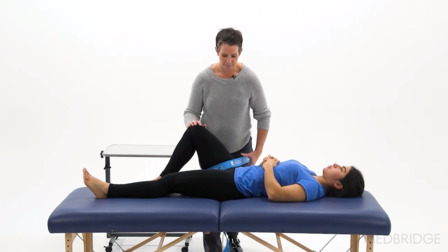A Primer on Exercise and Treatment Prescription
Presented by Alexis Wright
12-Month Subscription
Unlimited access to:
- Thousands of CE Courses
- Patient Education
- Home Exercise Program
- And more
Non-Financial: Lexie Wright has no competing non-financial interests or relationships with regard to the content presented in this course.
There is an abundance of evidence to support the use of therapeutic exercise in improving pain across a number of musculoskeletal conditions when done appropriately. This course will review the principles of therapeutic exercise and the physiological principles behind how exercise can facilitate tissue healing. Exercise prescription training principles and variables are reviewed, including progressive overload, specificity, variation, reversibility, and individualization. Viewers will be provided general guidance and recommendations of resistance training in accordance with the American College of Sports Medicine in how to design a program, including training guidelines for strength, power, endurance, hypertrophy, and plyometric training. A review of load management is presented with tips on how to improve load management specific to tissue type. A model of how to progress exercises is presented, with sample exercises and progressions presented to enhance the viewer's exercise prescription skills.
Meet your instructor

Alexis Wright
Alexis A. Wright serves as professor and program director for the Tufts DPT Boston program. Wright has been invested in DPT education since 2011. She was recognized as a fellow of the American Academy of Orthopaedic Manual Physical Therapists in 2011 and achieved APTA board-certified orthopedic specialization in 2015. Wright…
Chapters & learning objectives

1. Navigating the Exercise Prescription Road Map to Healthy Recovery
This chapter will review the principles of therapeutic exercise and the physiological principles behind how exercise can facilitate tissue healing. Viewers will be introduced to terminology, including mechanotherapy, or the turning of movement into repair. Introduction of common tissue healing times and physiological adaptations will be discussed, including a discussion on mechanotherapy/mechanotransduction and how exercise promotes tissue repair.

2. Prescription Training Principles and Variables Estimated Length
This chapter will review exercise training principles, including progressive overload, specificity, variation, reversibility, and individualization. Recommendations and basic principles of resistance training in accordance with the American College of Sports Medicine are introduced, including training guidelines for strength, power, endurance, hypertrophy, and plyometric training. Progression in terms of duration, speed, distance, and repetitions will be discussed.

3. Load Management
We will discuss the principle of "optimal loading," including characteristics of optimal versus suboptimal loading and tissue-specific loading factors. The POLICE principle is explained with regard to acute injury management.

4. Framework for Exercise Prescription and Progression
This chapter will discuss clinical decision-making with regard to initiation, progression, and regression of exercise. Further phases of progression will be focused on extrinsic factors, such as change in stimulus or the environment in which the exercise is performed. A sample exercise progression program is provided to the viewer at the end of this chapter.

5. FITTSBALL
This chapter will introduce the viewer to a more holistic approach to exercise prescription that blends the technical domain with the cognitive-behavioral domain and methods for improving patient adherence to exercise.
More courses in this series

Crucial Factors Influencing Health & Recovery in Musculoskeletal Care
Chad Cook

Evidence-Based Examination of the Cervical Spine: An Update
Chad Cook

Evidence-Based Treatment of the Cervical Spine: An Update
Chad Cook

Cervical Spine Examination and Treatment: Cases to Synthesize Learning
Chad Cook

Evidence-Based Examination of the Thoracic Spine: An Update
Chad Cook

Evidence-Based Treatment of the Thoracic Spine: An Update
Chad Cook

Thoracic Spine Examination and Treatment: Cases to Synthesize Learning
Chad Cook

Evidence-Based Examination of the Lumbar Spine: An Update
Chad Cook

Evidence-Based Treatment of the Lumbar Spine: An Update
Chad Cook

Lumbar Spine Examination and Treatment: Cases to Synthesize Learning
Chad Cook

Evidence-Based Examination of the Elbow, Wrist, and Hand: An Update
Chad Cook

Evidence-Based Treatment of the Elbow, Wrist, and Hand: An Update
Chad Cook

Elbow, Wrist, and Hand Examination and Treatment: Cases to Synthesize Learning
Chad Cook

A Primer on Exercise and Treatment Prescription
Alexis Wright

Evidence-Based Examination of the Hip: An Update
Alexis Wright

Evidence-Based Treatment of the Hip: An Update
Alexis Wright

Hip Examination and Treatment: Cases to Synthesize Learning
Alexis Wright

Evidence-Based Examination of the Foot and Ankle: An Update
Alexis Wright

Evidence-Based Treatment of the Foot and Ankle: An Update
Alexis Wright

Foot and Ankle Examination and Treatment: Cases to Synthesize Learning
Alexis Wright

Evidence-Based Examination of the SIJ/Pelvis
Alexis Wright

Evidence-Based Treatment of the SIJ/Pelvis
Alexis Wright

A Primer on Examination and Treatment Metrics
Eric Hegedus

Evidence-Based Examination of the Shoulder: An Update
Eric Hegedus

Special Tests of the Shoulder
Eric Hegedus

Evidence-Based Treatment of the Shoulder: An Update
Eric Hegedus

Management of the Shoulder: Case-Based Vignettes
Eric Hegedus

Evidence-Based Examination of the Knee and Thigh: An Update
Eric Hegedus

Special Tests of the Knee
Eric Hegedus

Evidence-Based Treatment of the Knee and Thigh: An Update
Eric Hegedus

Management of the Knee and Thigh: Case-Based Vignettes
Eric Hegedus